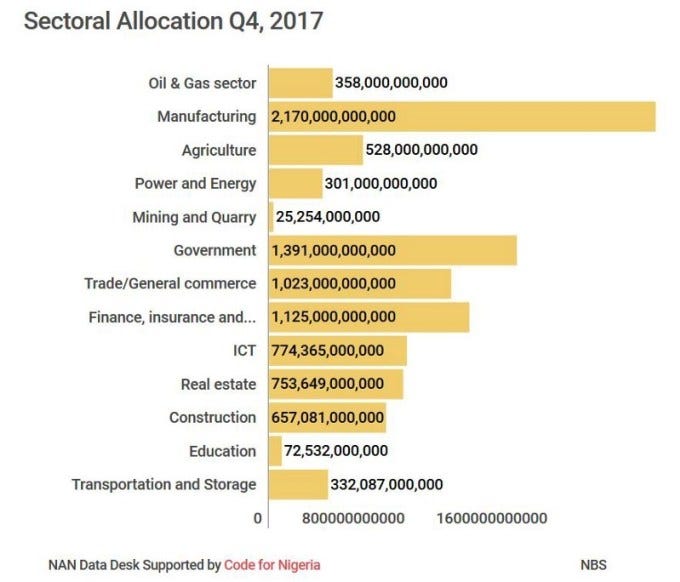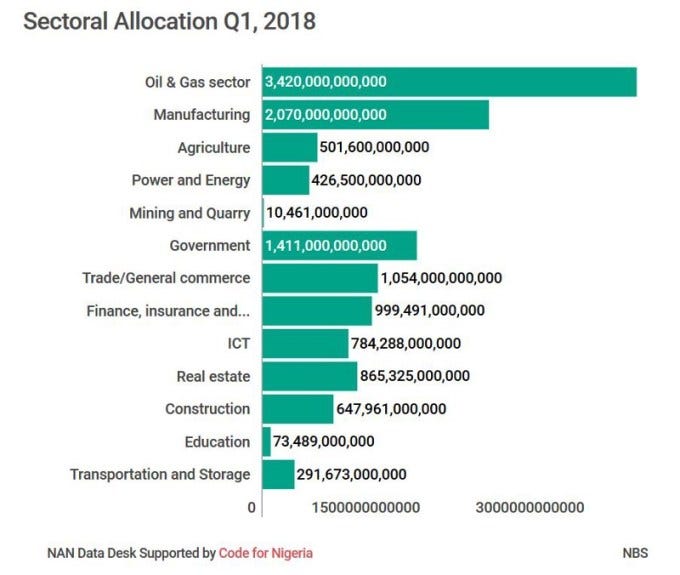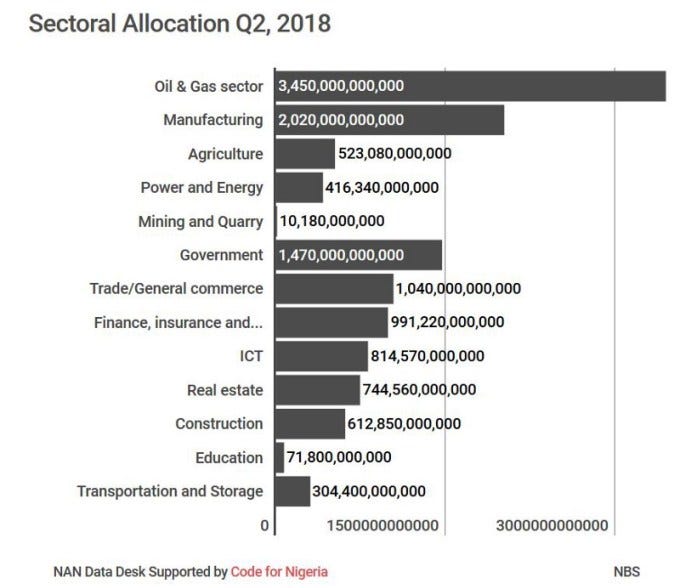More Loans From Banks May Be Available To Nigerian Businesses In 2020
For businesses in Nigeria looking for loans from banks to grow, 2020 looks a bit brighter for them. Nigeria’s Central Bank CBN) has insisted that every bank must give out 65% of all deposits customers make in it as loans. Out of the 65% of all deposits given out as loans, banks are further directed to give out 150% of it to startups and SMEs. This however would only be applicable to commercial and merchant banks in the country. The central bank said it made the decision because figures from 2019 and previous years showed that banks are now approving more loans to businesses in the private sector.

“The CBN has noticed remarkable increase in the size of gross credit by deposit money banks (DMBs) to customers,’’ a letter addressed to all banks in Nigeria reads in part. ‘‘Accordingly, the CBN has decided to retain the minimum 65 per cent LDR in the interim. All DMBs are required to maintain this level and are further advised that average daily figures are to be applied to assess compliance going forward.
Here Is All You Need To Know
- According to the central bank the deadline for banks to achieve the 65 per cent LDR passed on December 31, 2019, with sanctions applied on those that defaulted.
“The incentive which assigns a weight of 150 per cent in respect of lending to SMEs, retail, mortgage and consumer lending shall continue to apply, while failure to achieve the target shall continue to attract a levy of additional cash reserve requirement of 50 per cent of the lending shortfall of the target LDR on or before March 31, 2020.
“DMBs (Deposit Money Banks) are further encouraged to maintain strong risk management practices regarding their lending operations. The CBN shall continue to monitor compliance, review market developments and make further alterations in the LDR as it deems appropriate,” the letter further reads.
- The CBN had in July, directed commercial banks to maintain a minimum LDR of 60 per cent effective from September 30, 2019. However, at the end of September, the stipulated minimum level was raised to 65 per cent, with a fresh deadline of December 31, 2019.

What Startups And SMEs In Nigeria Should Watch Out For
This is a huge opportunity for startups and SMEs in Nigeria to get loans from banks in the country as more banks may be scrambling after them or set up programmes that may benefit them. According to this CBN’s policy, a review would be carried out every three months in a year, starting from 2020 in order to determine whether the banks have complied with the lending policy or not. Any banks which fail to comply with the policy would be punished.
“To encourage SMEs, retail, mortgage and consumer lending, these sectors shall be assigned a weight of 150 per cent in computing the LDR for this purpose,’’ the letter further reads.
“The CBN shall provide a framework for classification of enterprises/businesses that fall under these categories.
“Failure to meet the above minimum LDR by the specified date shall result in a levy of additional cash reserve requirement (CRR) equal to 50 per cent of the lending shortfall of the target LDR.
“The CBN shall continue to review development in the market with a view to facilitating greater investment in the real sector of the
However, startups and SMEs in Nigeria will not take any loans without some heavy burdens.
Recall that the Nigerian central bank has recently instructed that once you are taking out any loans from any Nigerian bank, you are at same time permitting the bank to withdraw your deposits from other banks you may have accounts with, in order to repay your loan in the former bank in the event of your failure to pay back the loan on time.
“If you don’t pay the loans you collected from a bank, we will use your deposits in other banks to service your loans,” MD of Nigeria’s largest bank by market cap Guaranty Trust Bank, Segun Agbaje said.
Consquently, next time signing loan agreements with any banks or financial institutions in Nigeria, startups or individuals should watch out for a clause in the loan agreement that permits the lender to use their deposits in other banks to service their loans. This is because currently, no law permits banks in Nigeria to breach the duty of confidence and good faith they owe their customers. However, expect argument as to whether this new move by the CBN is an extension of the powers of the Central Bank of Nigeria under Nigeria ’s Central Bank Act. In the meantime, the bankers Committee has decided that bank borrowers would be made to sign an agreement that if there was a default, the bank would have a right to access the borrowers other accounts. Hence, banks would be looking to rely on this clause in defence of any of their action.Therefore, it is advisable to consider the terms of loan instruments before appending signatures.

This is The First Time The Central Bank of Nigeria Is Asking Banks In The Country To Do This
Previously, Nigeria had no rule on minimum loan-to-deposit ratios. However, many Nigerian lenders have pegged ratios of about 40%.
However, Nigerian banks are so reluctant with lending to businesses and have resisted lending to businesses and consumers and instead piled their cash into naira bonds, which yield 14.3% on average, one of the highest rates globally.
Lenders worry that with inflation at more than 11%, extending more credit could endanger the financial system through an increase in non-performing loans, or NPLs.
That makes some analysts skeptical of whether the new measures will work.
“Forcing banks to lend under the current macro-economic situation will only result in a buildup in Non-performing loans,” analysts at Lagos-based CSL Research, including Gloria Fadipe, said in a note to clients.
“This could pose a risk to financial stability.”
Bad Loans
Non-performing loans as a percentage of total credit in the Nigerian banking industry declined to 11% in the first quarter from 14% a year ago, according to the National Bureau of Statistics.
Past experience with such measures isn’t encouraging. The central bank last year allowed banks to use their statutory cash reserves to fund manufacturers on the condition that such loans were at a maximum interest rate of 9% and a minimum maturity of seven years. The lenders didn’t take advantage of the policy due to credit risk and high returns on government bonds, according to Michael Famoroti, an economist and partner at Stears Business.

The Implication of This To Businesses
With this move, it is expected that Nigeria ‘s money deposit banks are going to loosen up money (by way of loans and other credit facilities) to Nigerians. For businesses desiring to raise funds, from January 1, 2020 may be the best time to laugh as more banks would be rushing after them. However, it remains whether Nigeria’s commercial banks would not fight back, by either setting up SPVs or lending to more stable corporations, big or small, in which case the vision of the CBN may have been defeated.
In any case, businesses should, once again, dust up their loan procurement files and get set for January 1, 2020.
Charles Rapulu Udoh

Charles Rapulu Udoh is a Lagos-based lawyer who has advised startups across Africa on issues such as startup funding (Venture Capital, Debt financing, private equity, angel investing etc), taxation, strategies, etc. He also has special focus on the protection of business or brands’ intellectual property rights ( such as trademark, patent or design) across Africa and other foreign jurisdictions.
He is well versed on issues of ESG (sustainability), media and entertainment law, corporate finance and governance.
He is also an award winning writer.
He could be contacted at udohrapulu@gmail.com





